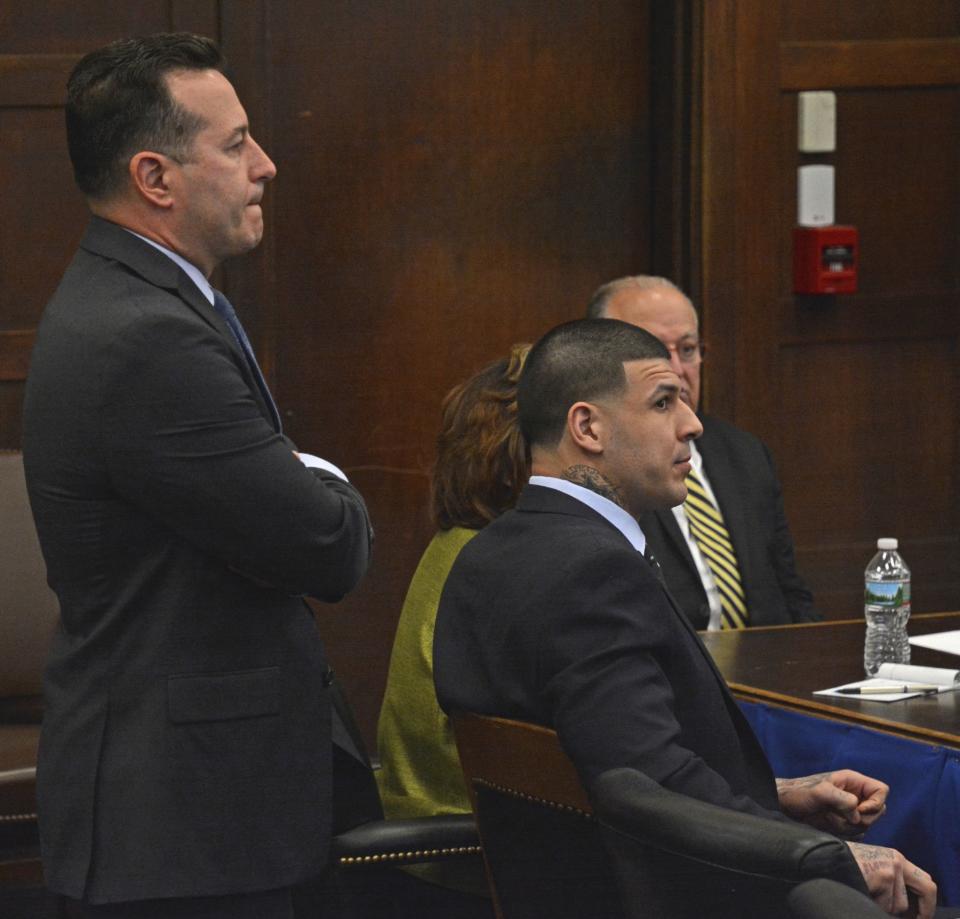Accusations of racism fly in Aaron Hernandez trial
BOSTON – As the jury entered its second day of deliberation, the Aaron Hernandez double-murder trail reached the point where the judge and the defense are accusing each other of racism.
The issue centers on the jury.
Fifteen were selected with the eventual goal of impaneling 12 to make the decision on whether Hernandez murdered Daniel de Abreu and Safiro Furtado in a 2012 Boston drive-by shooting. They finished Monday with no verdict and will continue Tuesday morning.
The exact ethnic background of each juror isn’t known or recorded by the court, however the defense is taking issue with Suffolk County Judge Jeffrey Locke selecting what it called “a white woman” as the foreperson on two counts:
1. The diverse makeup of the jury.
2. And the fact the selection occurred before the three alternates were chosen via lottery. This assured a white woman was on the jury and thus decreased the odds of an additional person of color.
By picking the white woman first, that left 14 jurors for 11 spots via blind draw. The final makeup of the jury is, by the estimation of the court, two white women, two white men, two black women, one black man, three Hispanic women, one Hispanic man and one Asian man.
The defense has deemed the jury makeup as acceptable and “overwhelmingly ethnic and minority” – essentially eight of the 12 jurors. Hernandez is of Puerto Rican and Italian descent. The victims in this case, de Abreu and Furtado, were immigrants from Cape Verde, an island nation off the coast of Western Africa. Hernandez is also accused of shooting a third Cape Vedean, as well as a witness, Alexander Bradley, who identified himself as African-American on the stand.
Last Thursday the defense first filed the objection, claiming Locke had created “extraordinary troubling racial overtones that implicate the defendant’s due process rights.” By choosing a white woman first, defense attorney Ronald Sullivan argued, it not only lowered the odds that people of color would make the jury but conveyed a sense of unfairness that a group that is predominantly of color would have a white foreperson.
Locke, who is white, responded to the issue Monday morning in an intense back and forth with Sullivan, who is black.
“Accusing any court of being racist is not only offensive to the individual judge but extraordinarily offensive to the tribunal and the integrity of the tribunal,” Locke argued.
Sullivan didn’t back down.
“We find it offensive, frankly,” said Sullivan, who is also a Harvard law professor. “We find it offensive that with this jury, predominantly filled with people of color, that these people can’t self-govern, they can not self-regulate. That this court, immunized by effect one white juror and makes that juror the leader of the group. We find that offensive.”
Locke said that excluding a white woman because she is a white woman would have been unfair along racial grounds.
“It seems to me it is implicit in that claim that a white woman should have been excluded from that selection based on gender and color,” Locke said. “… Frankly, I find it astounding you would make that claim.”
Sullivan continued his argument, noting that at the beginning of the trial Locke told the jurors they would have equal opportunity to both serve and be named foreperson. The three alternates consist, in the court’s estimation, of two whites and a Hispanic.
“Your Honor should have done what you said and given every person of color the same opportunity to serve on this jury as that white person,” Sullivan said. “You told the jury one thing and did the other.”
Locke said it is his longstanding practice to select a foreperson before the alternates are picked. It appears to be within the standard of trial judges in Massachusetts. He said he makes his selection based on what he observes to be the level of concentration displayed by the juror during the trial.
“I’ve always selected a foreperson before selecting alternates,” said Locke, who has served as a Superior Court associate justice since 2001. “It would be foolish to do otherwise. It would be foolish to take a well-qualified juror who’d given close and careful attention throughout the trial and would be able to perform that function and knock them off just by random draw. I don’t know any judge in the Commonwealth who would do that.”
At that point, both sides appeared exasperated. Hernandez, the former New England Patriots star who is already serving a sentence of life without the possibility of parole for a 2013 murder, sat at the defense table and listened intently.
“I don’t know if I understand your position, but at least I’ve explored it,” Locke said.
“It’s on the record,” Sullivan said. “It is what it is at this point.”
“OK, let us be in recess as we wait to hear from our jurors,” Locke said.
To that, everyone agreed.


